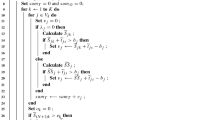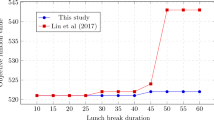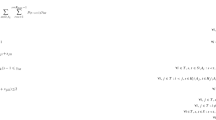Abstract
Solving university course timetabling problems is a large and complex task. Moreover, every new academic term, a new timetable is likely to be scheduled due to disruptions (e.g., changes in teacher-lecture allocation). Nevertheless, the university infrastructure, the overall curricular plans, and the number of students/teachers is still very similar in consecutive terms. For this reason, a timetable does not need to be always scheduled from scratch since it can produce a completely different solution from the previous one, thus creating undesirable changes for many actors. This paper addresses the Minimal Perturbation Problem (MPP) in university course timetabling. Given a set of disruptions that make a timetable no longer feasible, a solution to the MPP is the closest new feasible timetable with respect to the original timetable. We propose and analyze two different integer programming models to encode the MPP. To validate the proposed models, disruptions are randomly generated based on the probability distributions learned from the history of timetables over the last five years in the Instituto Superior Técnico (IST) the engineering school from Universidade de Lisboa. Overall, our models, combined with an incremental approach, are shown to be able to efficiently solve all problem instances.



Similar content being viewed by others
Notes
At IST, the assignment of teachers to lectures is only performed after the schedule is created. Therefore, this number is computed based on the timetables from the previous year.
RAPIDXML is available from http://rapidxml.sourceforge.net/manual.html.
References
Asín Achá, R. J., & Nieuwenhuis, R. (2014). Curriculum-based course timetabling with SAT and MaxSAT. Annals Operations Research, 218(1), 71–91. https://doi.org/10.1007/s10479-012-1081-x.
Banbara, M., Inoue, K., Kaufmann, B., Okimoto, T., Schaub, T., Soh, T., et al. (2019). \(teaspoo{n}\): Solving the curriculum-based course timetabling problems with Answer Set Programming. Annals Operations Research, 275(1), 3–37. https://doi.org/10.1007/s10479-018-2757-7.
Bellio, R., Gaspero, L. D., & Schaerf, A. (2012). Design and statistical analysis of a hybrid local search algorithm for course timetabling. Journal of Scheduling, 15(1), 49–61. https://doi.org/10.1007/s10951-011-0224-2.
Bettinelli, A., Cacchiani, V., Roberti, R., & Toth, P. (2015). An overview of curriculum-based course timetabling. TOP, 23(2), 313–349. https://doi.org/10.1007/s11750-015-0366-z.
Beyrouthy, C., Burke, E. K., Landa-Silva, D., McCollum, B., McMullan, P., & Parkes, A. J. (2009). Towards improving the utilization of university teaching space. Journal of the Operational Research Society, 60(1), 130–143. https://doi.org/10.1057/palgrave.jors.2602523.
Burke, E. K., Mareček, J., Parkes, A. J., & Rudová, H. (2008). Penalising patterns in timetables: Novel integer programming formulations. In Operations Research Proceedings (pp 409–414). New York: Springer https://doi.org/10.1007/978-3-540-77903-2_63.
Burke, E. K., Marecek, J., Parkes, A. J., & Rudová, H. (2010). Decomposition, reformulation, and diving in university course timetabling. Computers & Operations Research, 37(3), 582–597. https://doi.org/10.1016/j.cor.2009.02.023.
Cacchiani, V., Caprara, A., Roberti, R., & Toth, P. (2013). A new lower bound for curriculum-based course timetabling. Computers & Operations Research, 40(10), 2466–2477. https://doi.org/10.1016/j.cor.2013.02.010.
de Souza Rocha, W., Claudia, M., Boeres, S., & Rangel, M.C. (2012). A GRASP algorithm for the university timetabling problem. In Proceeding of 9th international conference of the practice and theory of automated timetabling (PATAT) (pp. 404–406).
Di Gaspero, L., Schaerf, A., & McCollum, B. (2007). The second international timetabling competition (ITC-2007): Curriculum-based course timetabling (track 3). Tech. Rep., Queen’s University.
Elkhyari, A., Guéret, C., & Jussien, N. (2002). Solving dynamic resource constraint project scheduling problems using new constraint programming tools. In Proceeding of 4th international conference of the practice and theory of automated timetabling (PATAT) (pp. 39–62). https://doi.org/10.1007/978-3-540-45157-0_3
Even, S., Itai, A., & Shamir, A. (1976). On the complexity of timetable and multicommodity flow problems. Society for Industrial and Applied Mathematics SIAM Journal on Computing, 5(4), 691–703. https://doi.org/10.1137/0205048.
Fylstra, D. H., Lasdon, L. S., Watson, J., & Waren, A. D. (1998). Design and use of the Microsoft Excel solver. Interfaces, 28(5), 29–55. https://doi.org/10.1287/inte.28.5.29.
Gurobi Optimization L. (2018). Gurobi optimizer reference manual. http://www.gurobi.com
Hamming, R. W. (1950). Error detecting and error correcting codes. The Bell System Technical Journal, 29(2), 147–160. https://doi.org/10.1002/j.1538-7305.1950.tb00463.x.
Kingston, J. H. (2013). Educational timetabling. In Automated Scheduling and Planning—From Theory to Practice (pp. 91–108). New York: Springer. https://doi.org/10.1007/978-3-642-39304-4_4
Kingston, J.H. (2016). Specifying and solving minimal perturbation problems in timetabling. In Proceeding of 11th International Conference of the Practice and Theory of Automated Timetabling (PATAT) (pp. 207–210).
Ku, W., & Beck, J. C. (2016). Mixed integer programming models for job shop scheduling: A computational analysis. Computers & Operations Research, 73, 165–173. https://doi.org/10.1016/j.cor.2016.04.006.
Lach, G., & Lübbecke, M.E. (2008). Optimal university course timetables and the partial transversal polytope. In Experimental Algorithms, 7th International Workshop (pp. 235–248). https://doi.org/10.1007/978-3-540-68552-4_18
Lemos, A., Melo, F. S., Monteiro, P. T., & Lynce, I. (2019). Room usage optimization in timetabling: A case study at universidade de lisboa. Operations Research Perspectives, 6(100), 092. https://doi.org/10.1016/j.orp.2018.100092.
Lemos, A., Monteiro, P.T., & Lynce, I. (2020a). ITC 2019: University Course Timetabling with MaxSAT. In Practice and Theory of Automated Timetabling 2021 (Vol. 1).
Lemos, A., Monteiro, P. T., & Lynce, I. (2020b). Minimal perturbation in university timetabling with maximum satisfiability. In Proceedings of 16th international conference on integration of constraint programming, artificial intelligence, and operations research (CPAIOR). Preprint at http://web.tecnico.ulisboa.pt/alexandre.lemos/papers/CPAIOR20.pdf.
Lindahl, M., Stidsen, T., & Sørensen, M. (2019). Quality recovering of university timetables. European Journal of Operational Research, 276(2), 422–435. https://doi.org/10.1016/j.ejor.2019.01.026.
McCollum, B. (2006). University timetabling: Bridging the gap between research and practice. In Proceedings of the 5th international conference on the practice and theory of automated timetabling (PATAT) (pp. 15–35). New York: Springer. https://doi.org/10.1007/978-3-540-77345-0_1.
Müller, T. (2009). ITC-2007 solver description: A hybrid approach. Annals of Operations Research, 172(1), 429. https://doi.org/10.1007/s10479-009-0644-y.
Müller, T., Rudová, H., & Barták, R. (2004). Minimal perturbation problem in course timetabling. In Proceedings of the 5th international conference on the practice and theory of automated timetabling (PATAT) (pp. 126–146). https://doi.org/10.1007/11593577_8.
Müller, T., Rudová, H., & Müllerová, Z. (2018). University course timetabling and international timetabling competition 2019. In Proceedings of the 12th international conference on the practice and theory of automated timetabling (PATAT) (p. 27).
Phillips, A. E., Walker, C. G., Ehrgott, M., & Ryan, D. M. (2017). Integer programming for minimal perturbation problems in university course timetabling. Annals Operations Research, 252(2), 283–304. https://doi.org/10.1007/s10479-015-2094-z.
Pillay, N., & Özcan, E. (2019). Automated generation of constructive ordering heuristics for educational timetabling. Annals Operations Research, 275(1), 181–208. https://doi.org/10.1007/s10479-017-2625-x.
Roussel, O. (2011). Controlling a solver execution with the runsolver tool. Journal on Satisfiability, Boolean Modelling and Computation, 7(4), 139–144.
Sakkout, H. E., & Wallace, M. (2000). Probe backtrack search for minimal perturbation in dynamic scheduling. Constraints, 5(4), 359–388. https://doi.org/10.1023/A:1009856210543.
Sherali, H. D., & Adams, W. P. (1998). Reformulation-linearization techniques for discrete optimization problems. In Handbook of combinatorial optimization (pp. 479–532). New York: Springer.
Vermuyten, H., Lemmens, S., Marques, I., & Beliën, J. (2016). Developing compact course timetables with optimized student flows. European Journal of Operational Research, 251(2), 651–661. https://doi.org/10.1016/j.ejor.2015.11.028.
Vrielink, R. A. O., Jansen, E. A., Hans, E. W., & van Hillegersberg, J. (2019). Practices in timetabling in higher education institutions: A systematic review. Annals Operations Research, 275(1), 145–160. https://doi.org/10.1007/s10479-017-2688-8.
Zivan, R., Grubshtein, A., & Meisels, A. (2011). Hybrid search for minimal perturbation in dynamic csps. Constraints, 16(3), 228–249. https://doi.org/10.1007/s10601-011-9108-5.
Author information
Authors and Affiliations
Corresponding author
Additional information
Publisher's Note
Springer Nature remains neutral with regard to jurisdictional claims in published maps and institutional affiliations.
The authors would like to thank the reviewers for their helpful comments and suggestions that contributed to an improved manuscript. This work was supported by national funds through Fundação para a Ciência e a Tecnologia (FCT) with reference SFRH/BSAB/143643/2019 (sabbatical Grant), SFRH/BD/143212/2019 (PhD Grant), DSAIPA/AI/0044/2018 (project Data2help) and UIDB/50021/2020 (INESC-ID multi-annual funding).
Rights and permissions
About this article
Cite this article
Lemos, A., Monteiro, P.T. & Lynce, I. Disruptions in timetables: a case study at Universidade de Lisboa. J Sched 24, 35–48 (2021). https://doi.org/10.1007/s10951-020-00666-3
Published:
Issue Date:
DOI: https://doi.org/10.1007/s10951-020-00666-3




